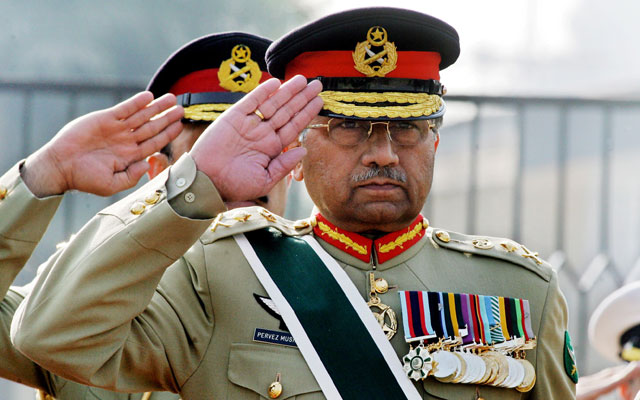Today’s indictment of former Pakistani President Pervez Musharraf for conspiracy to murder former Prime Minister Benazir Bhutto demonstrates that the Pakistani judiciary is increasingly willing to challenge the authority of the powerful Pakistani Army.
While it is in the U.S. interest that Pakistan’s democratic institutions are strengthened and that the military stays out of politics, sentencing Musharraf to a harsh prison sentence or capital punishment is unjustified and could fuel a civil-military crisis that would increase political instability and embolden terrorist forces in the country.
Musharraf has been under house arrest since April and faces other serious accusations, including committing treason by detaining dozens of senior judges after declaring emergency rule in 2007 (which he did), and the murder of Baloch nationalist leader Akbar Bugti in 2006 (whom the Pakistani Army killed in an operation ordered by Musharraf).
Charges of a conspiracy to murder Bhutto will likely be difficult to prove, and it is possible the case will drag on for several months. It is widely acknowledged that Musharraf failed to provide adequate security for Benazir Bhutto, but few international observers believe he conspired to have her killed.
A United Nations investigation into Bhutto’s assassination found that security provided to the former prime minister was “insufficient and ineffective” and that the subsequent Pakistani criminal investigation into the murder was “severely hampered by intelligence agencies and other government officials.” However, Bhutto was a target of several Pakistani militant organizations for her liberal views on democracy and tough stance toward terrorism. Her party, the Pakistan People’s Party, went on to win elections four months after her assassination.
Musharraf miscalculated badly in his decision to try to return to the political fray in Pakistan. He underestimated the level of public anger against him for his handling of events in 2007, particularly his undermining of the democratic process.
While the current military leadership does not want to see any of its own dragged through the courts, it is unclear how far Chief of Army Staff General Kayani would go to influence or pressure the courts over the case.
Kayani must pay attention to the public’s attitude toward the military and thus would be unlikely to pursue a high-profile confrontation with the judiciary over Musharraf, who has become widely despised in Pakistan. It is possible that Kayani would try to broker a deal behind the scenes that forces Musharraf to leave the country but spares his life and keeps him out of a Pakistani prison.
While Musharraf is unpopular, he appears to have support from some shadowy elements, and those pursuing cases against Musharraf are clearly under threat. In May, gunmen assassinated the chief prosecutor in the case against Musharraf, Chaudhry Zulfikar Ali, as he drove to work from his home in Islamabad.
For his part, Prime Minister Nawaz Sharif will want to avoid a direct showdown with the military. He knows from past experience that going up against the military is generally a losing proposition. But the judiciary in Pakistan has become more powerful since the lawyer’s movement to oust Musharraf in 2007. Even if Sharif wanted the courts to pardon Musharraf, it is questionable whether he alone could influence them to do so.
The showdown over Musharraf’s fate is far from over. But for now, judicial leaders are demonstrating their willingness to challenge the military and establishing that they also have a powerful role in charting the future political direction of the country.





















